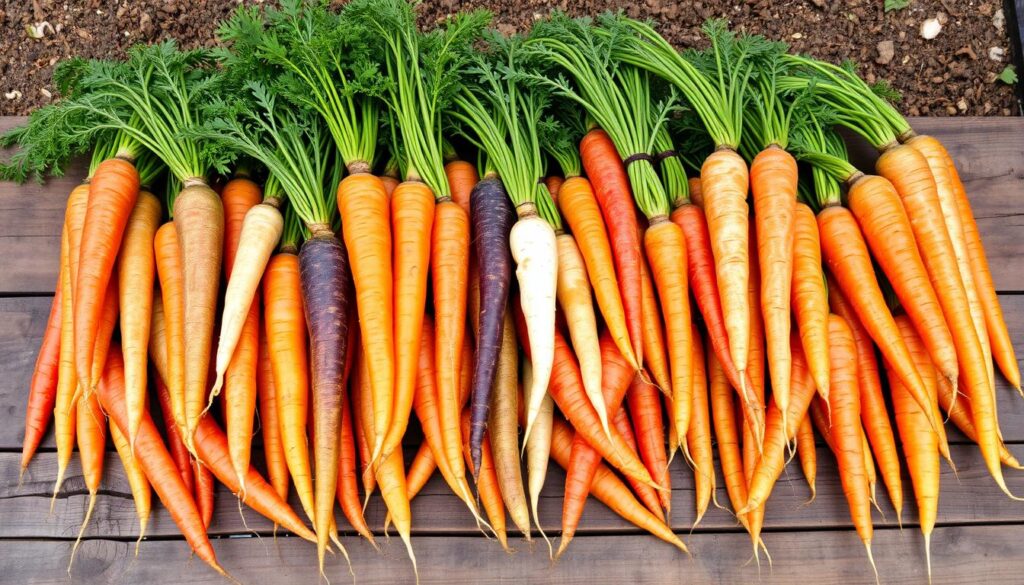As a young child, I vividly remember the bright orange carrots on my plate. I didn’t know then how much they would impact my health. Carrots are now a key part of my diet, and for good reasons. Let’s dive into the top 10 health benefits of carrots.
Key Takeaways:
- Carrots are low in calories, high in fiber, and rich in essential vitamins and minerals.
- Beta-carotene, the pigment that gives carrots their orange color, is a powerful antioxidant. It supports eye health and immune function.
- Consuming carrots may help lower the risk of certain types of cancer and heart disease.
- Carrots are flexible and can be delighted in in a assortment of dishes, from soups and stews to simmered side dishes and juices.
- Incorporating a variety of colorful fruits and vegetables, including carrots, into your diet provides a wealth of essential nutrients. This supports overall health and well-being.
Understanding Carrots: History and Varieties
Carrots are a simple yet versatile root vegetable with a rich history. They first appeared in Afghanistan around 900 AD. Back then, carrots were mostly purple or yellow. It wasn’t until the 15th or 16th century that the orange carrot we know today was bred in Central Europe.
Origin and Evolution of Carrots
The carrot we know today comes from Central Asia. Its wild ancestors were found in Greater Iran. Carrot seeds were found in Switzerland and Southern Germany from 2000–3000 BC.
The Arabs brought carrots to Western Europe. One type, D. carota sativus, is native to Turkey. It was eaten by armies in the 10th century.
Different Types of Carrots Available
Now, you can find many carrot varieties, each with its own traits. You might see Imperator, Nantes, Danvers, and Chantenay carrots. These were bred to meet supermarket needs.
Organic vs. Conventional Carrots
Organic and conventional carrots have similar nutrients. But organic farming is better for the environment. Organic carrots use natural fertilizers and pest control.
Conventional carrots might have pesticide residues. Despite this, carrots remain popular worldwide. Their color is important in many cultures, keeping traditional varieties alive.
| Carrot Variety | Characteristics |
|---|---|
| Imperator | A cross between Nantes and Chantenay carrots, forming the basis for most modern cultivars developed for supermarkets. |
| Nantes | A cylindrical, smooth-skinned variety with a blunt, rounded end. |
| Danvers | A conical, tapered variety with a pointed tip, known for its high yield and storage capabilities. |
| Chantenay | A short, stocky variety with a broad, rounded shoulder and a tapered tip. |

“Carrots are a rich source of Vitamin A due to beta-carotene, which provides the characteristic orange color.”
Nutritional Profile of CARROT
Carrots are a nutritional powerhouse, packed with essential vitamins, minerals, and dietary fiber. A medium-sized carrot (61g) has 25 calories, 0.5g of protein, 6g of carbohydrates, and 0g of fat. They are an excellent source of vitamin A, with one medium carrot giving 509mcg, or 73% of the daily need.
Carrots also have a lot of vitamin K, potassium, fiber, vitamin C, calcium, and iron. They are mostly water (86-95%) and carbs (10%), but low in fat and protein. They are rich in beta-carotene, biotin, and vitamins K1 and B6.
| Nutrient | Amount per 1 medium carrot (61g) | % Daily Value |
|---|---|---|
| Calories | 25 | – |
| Protein | 0.5g | 1% |
| Carbohydrates | 6g | 2% |
| Fiber | 2g | 7% |
| Vitamin A | 509mcg | 73% |
| Vitamin K | 6.1mcg | 8% |
| Potassium | 195mg | 4% |
Carrots are a great source of dietary fiber, with a cup of chopped carrots giving 3.6 grams. This supports digestive health and helps you feel full. They are also low on the glycemic index, making them good for people with diabetes.

Carrots are great whether eaten raw, cooked, or juiced. They offer many nutritional benefits that are good for your health. Their taste and versatility make them a favorite in many homes.
Vision and Eye Health Benefits
Carrots are famous for their eye health benefits. They are packed with beta-carotene, a key antioxidant. This antioxidant turns into vitamin A in our bodies, which is vital for clear vision.
Beta-carotene shields our eyes from UV sun damage. It also lowers the chance of getting cataracts and other eye problems as we age.
The lutein in yellow carrots might help fight age-related macular degeneration. This is a enormous cause of vision misfortune in more seasoned individuals. Eating carrots regularly can also make our night vision better and prevent night blindness.
Beta-Carotene and Vision Protection
Carrots are full of beta-carotene, which our bodies turn into vitamin A. Vitamin A is key for healthy eyes and good vision. Research shows that beta-carotene’s antioxidants protect our eyes from sun damage and lower cataract risk.
Prevention of Age-Related Eye Conditions
As we get older, we face a higher risk of eye problems like macular degeneration. Yellow carrots contain lutein, which protects the macula. This part of the eye is crucial for central vision. Eating carrots can help keep our vision sharp as we age.
Role in Night Vision Enhancement
Carrots are also great for night vision because of their vitamin A. Vitamin A helps the retina work well in low light. Eating carrots often can make it easier to see in the dark, keeping our eyes healthy.
| Eye Health Benefit | Nutrient in Carrots | Potential Impact |
|---|---|---|
| Vision Protection | Beta-Carotene | Protects eyes from sun damage, reduces cataract risk |
| Macular Degeneration Prevention | Lutein | Helps prevent age-related macular degeneration |
| Night Vision Enhancement | Vitamin A | Improves the retina’s ability to adapt to low-light conditions |

“Carrots are a rich source of beta-carotene, which is converted to vitamin A in the body and plays a crucial role in maintaining healthy vision. Regular carrot consumption can help protect the eyes from sun damage and reduce the risk of age-related eye conditions.”
Heart Health and Blood Pressure Management
Carrots are a tasty addition to your meals and great for your heart. They are full of antioxidants and potassium. These help keep your heart healthy and blood pressure in check.
Potassium is key for blood pressure. One medium carrot gives you about 4% of your daily potassium. This helps blood vessels relax and lowers the risk of high blood pressure. Eating more potassium-rich foods like carrots can lower blood pressure by 4 to 5 mmHg.
Carrots also have fiber, which can lower cholesterol. This reduces heart disease risk. They are also low on the glycemic index, which means they won’t raise blood sugar. This makes them good for people with diabetes.
The antioxidants in carrots, like beta-carotene, protect the heart and blood vessels. They fight off free radicals. This keeps the vascular system strong and promotes heart health.
To support your heart and manage blood pressure, eat more carrots. Enjoy them raw, cooked, or juiced. They are tasty and good for your heart and blood vessels.
| Nutrient | Amount in 1 Medium Carrot | % of Daily Recommended Intake |
|---|---|---|
| Fiber | 1.7 grams | 5-7.6% |
| Potassium | 4% of daily requirement | 4% |
| Vitamin C | 3.6 milligrams | 4% |
| Vitamin A | 509 micrograms | 56-73% |
“Expending the suggested sum of potassium in your eat less can lower blood weight by around 4 to 5 mmHg.”
Cancer-Fighting Properties and Antioxidants
Carrots are not just tasty and versatile. They also have amazing cancer-fighting powers. This is because they are full of antioxidants. These help protect your cells from damage caused by free radicals, which can lead to cancer.
Types of Antioxidants Present
Carrots are packed with antioxidants like beta-carotene, alpha-carotene, lutein, and anthocyanins (in purple carrots). These powerful compounds work together. They help neutralize free radicals and boost your body’s defenses against cell damage.
Anti-Cancer Research Findings
Many studies show that eating foods rich in carotenoids, like carrots, can help fight cancer. This includes prostate, colon, and stomach cancers. Carrots also contain unique compounds called polyacetylenes. These have shown promise in fighting leukemia and other cancers.
Free Radical Protection
The antioxidants in carrots are key in fighting free radicals. Free radicals can cause oxidative stress and lead to cancer. By fighting these free radicals, carrots help protect your cells and lower the risk of cancer.
| Antioxidant | Benefits |
|---|---|
| Beta-carotene | Linked to a lower risk of breast cancer among smokers |
| Vitamin C | Associated with a reduced risk of breast, bladder, and gastric cancer |
| Vitamin E | Shown to reduce prostate cancer incidence by 32% in a clinical trial |
| Selenium | May help reduce oxidative tissue damage and cancer risk |
| Flavonoids | May lower breast cancer risk among the elderly by reducing oxidative stress |
Eating carrots and making healthy lifestyle choices can boost your body’s defenses against cancer. Enjoy the benefits of this vibrant vegetable and its amazing cancer-fighting powers.
Weight Management and Digestive Health
Carrots are a versatile vegetable that offer impressive benefits for weight management and digestive health. These low-calorie, fiber-rich root vegetables can be a valuable addition to any weight loss or weight maintenance plan.
The dietary fiber in carrots promotes feelings of fullness, potentially reducing overall calorie intake. Carrots have a low glycemic index, which helps regulate blood sugar levels. This prevents spikes that can lead to cravings and overeating. The insoluble fiber in carrots aids in preventing constipation and promoting regular bowel movements. The soluble fiber, such as pectin, can feed beneficial gut bacteria, supporting overall digestive health.
| Nutrient | Amount per 1 cup (122g) |
|---|---|
| Calories | 52 |
| Carbohydrates | 12g |
| Fiber | 3g |
| Vitamin A | 509% of the RDI |
Incorporating carrots into a balanced diet can be an effective strategy for weight loss and maintaining a healthy digestive system. Whether enjoyed raw, cooked, or juiced, these low-calorie root vegetables offer a wealth of nutritional benefits to support overall well-being.
Skin Health and Anti-Aging Properties
Carrots are a powerhouse for skin health and anti-aging. They are rich in vitamin A, thanks to beta-carotene, which helps skin cells renew. This keeps the skin looking healthy and vibrant. Carrots also have antioxidants like beta-carotene and vitamin C. These protect the skin from sun damage and may slow aging.
Vitamin A Benefits for Skin
Vitamin A, from beta-carotene in carrots, is key for skin wellbeing. It helps repair and regenerate skin cells, keeping it looking young and bright. It also controls oil production, which is good for acne-prone skin.
Antioxidant Effects on Aging
Carrots are full of cancer prevention agents like beta-carotene and vitamin C. These battle off free radicals that hurt skin cells and speed up maturing.
They help reduce fine lines and wrinkles, giving the skin a youthful look.
Collagen Production Support
Vitamin C in carrots is vital for making collagen. Collagen keeps skin elastic and strong, but its production drops with age. Carrots help keep skin firm and plump, fighting aging signs.
Eating carrots, through juicing, roasting, or adding to dishes, can make your skin look healthier and younger. This versatile veggie nourishes your skin from the inside.
| Skin Benefit | Nutrient in Carrots | Mechanism of Action |
|---|---|---|
| Skin Cell Regeneration | Vitamin A (Beta-Carotene) | Promotes skin cell turnover and maintenance |
| Sun Damage Protection | Antioxidants (Beta-Carotene, Vitamin C) | Neutralizes free radicals and prevents oxidative stress |
| Collagen Production | Vitamin C | Supports the synthesis of collagen, essential for skin elasticity |
Immune System Enhancement
Carrots are a powerhouse for your immune function. They are packed with vitamin A, vitamin C, and antioxidants. These nutrients help boost your body’s defense against invaders.
Vitamin A, from beta-carotene in carrots, is key for immune function. It helps your body fight off intruders and grow new cells. Vitamin C in carrots also supports white blood cells, your body’s first line of defense against infections.
The antioxidants in carrots, like carotenoids, reduce inflammation and oxidative stress. This boosts your immune health. These compounds fight free radicals and help your body fight off illnesses.
| Nutrient | Benefit for Immune Function |
|---|---|
| Vitamin A | Crucial for immune cell development and response |
| Vitamin C | Supports the production and activity of white blood cells |
| Antioxidants (Carotenoids) | Reduce inflammation and oxidative stress, promoting overall immune health |
Eating carrots is a great way to boost your immune function naturally. Enjoy them raw, cooked, or as juice. Adding more carrots to your meals gives your body the nutrients it needs to fight infections and keep your immune system strong.
Conclusion
Carrots are packed with health benefits, making them a key part of a balanced diet. They are rich in vitamins, minerals, and antioxidants. These nutrients support eye health, heart function, and may even help prevent cancer and improve skin.
Carrots can be enjoyed in many ways, from raw to cooked, in various dishes. Adding them to your meals boosts your health and wellness. They are also low in calories, perfect for a healthy lifestyle.
While no food alone can solve all health issues, carrots are a great start. By eating a variety of nutrient-rich foods like carrots, you can improve your health. Let carrots be a part of your daily routine and enjoy their many benefits.

